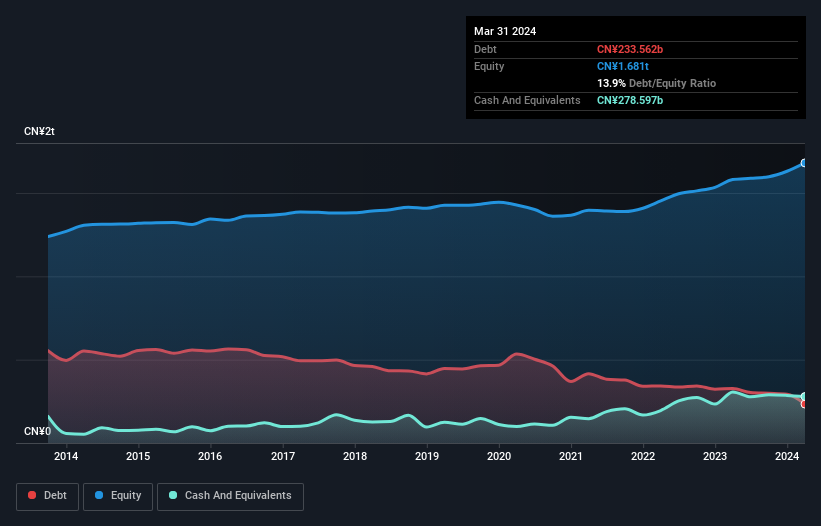- Hong Kong
- /
- Oil and Gas
- /
- SEHK:857
These 4 Measures Indicate That PetroChina (HKG:857) Is Using Debt Reasonably Well

The external fund manager backed by Berkshire Hathaway's Charlie Munger, Li Lu, makes no bones about it when he says 'The biggest investment risk is not the volatility of prices, but whether you will suffer a permanent loss of capital.' So it might be obvious that you need to consider debt, when you think about how risky any given stock is, because too much debt can sink a company. As with many other companies PetroChina Company Limited (HKG:857) makes use of debt. But is this debt a concern to shareholders?
When Is Debt Dangerous?
Debt is a tool to help businesses grow, but if a business is incapable of paying off its lenders, then it exists at their mercy. In the worst case scenario, a company can go bankrupt if it cannot pay its creditors. However, a more common (but still painful) scenario is that it has to raise new equity capital at a low price, thus permanently diluting shareholders. By replacing dilution, though, debt can be an extremely good tool for businesses that need capital to invest in growth at high rates of return. When we examine debt levels, we first consider both cash and debt levels, together.
Check out our latest analysis for PetroChina
What Is PetroChina's Net Debt?
As you can see below, PetroChina had CN¥233.6b of debt at March 2024, down from CN¥326.6b a year prior. But on the other hand it also has CN¥278.6b in cash, leading to a CN¥45.0b net cash position.

How Healthy Is PetroChina's Balance Sheet?
According to the last reported balance sheet, PetroChina had liabilities of CN¥627.8b due within 12 months, and liabilities of CN¥445.5b due beyond 12 months. Offsetting these obligations, it had cash of CN¥278.6b as well as receivables valued at CN¥93.2b due within 12 months. So its liabilities total CN¥701.5b more than the combination of its cash and short-term receivables.
This deficit isn't so bad because PetroChina is worth a massive CN¥1.54t, and thus could probably raise enough capital to shore up its balance sheet, if the need arose. But we definitely want to keep our eyes open to indications that its debt is bringing too much risk. While it does have liabilities worth noting, PetroChina also has more cash than debt, so we're pretty confident it can manage its debt safely.
While PetroChina doesn't seem to have gained much on the EBIT line, at least earnings remain stable for now. When analysing debt levels, the balance sheet is the obvious place to start. But ultimately the future profitability of the business will decide if PetroChina can strengthen its balance sheet over time. So if you're focused on the future you can check out this free report showing analyst profit forecasts.
Finally, while the tax-man may adore accounting profits, lenders only accept cold hard cash. While PetroChina has net cash on its balance sheet, it's still worth taking a look at its ability to convert earnings before interest and tax (EBIT) to free cash flow, to help us understand how quickly it is building (or eroding) that cash balance. During the last three years, PetroChina produced sturdy free cash flow equating to 72% of its EBIT, about what we'd expect. This free cash flow puts the company in a good position to pay down debt, when appropriate.
Summing Up
While PetroChina does have more liabilities than liquid assets, it also has net cash of CN¥45.0b. The cherry on top was that in converted 72% of that EBIT to free cash flow, bringing in CN¥150b. So we are not troubled with PetroChina's debt use. When analysing debt levels, the balance sheet is the obvious place to start. But ultimately, every company can contain risks that exist outside of the balance sheet. For example PetroChina has 2 warning signs (and 1 which is concerning) we think you should know about.
If you're interested in investing in businesses that can grow profits without the burden of debt, then check out this free list of growing businesses that have net cash on the balance sheet.
New: Manage All Your Stock Portfolios in One Place
We've created the ultimate portfolio companion for stock investors, and it's free.
• Connect an unlimited number of Portfolios and see your total in one currency
• Be alerted to new Warning Signs or Risks via email or mobile
• Track the Fair Value of your stocks
Have feedback on this article? Concerned about the content? Get in touch with us directly. Alternatively, email editorial-team (at) simplywallst.com.
This article by Simply Wall St is general in nature. We provide commentary based on historical data and analyst forecasts only using an unbiased methodology and our articles are not intended to be financial advice. It does not constitute a recommendation to buy or sell any stock, and does not take account of your objectives, or your financial situation. We aim to bring you long-term focused analysis driven by fundamental data. Note that our analysis may not factor in the latest price-sensitive company announcements or qualitative material. Simply Wall St has no position in any stocks mentioned.
About SEHK:857
PetroChina
Engages in a range of petroleum related products, services, and activities in Mainland China and internationally.
Undervalued with excellent balance sheet and pays a dividend.
Similar Companies
Market Insights
Community Narratives



